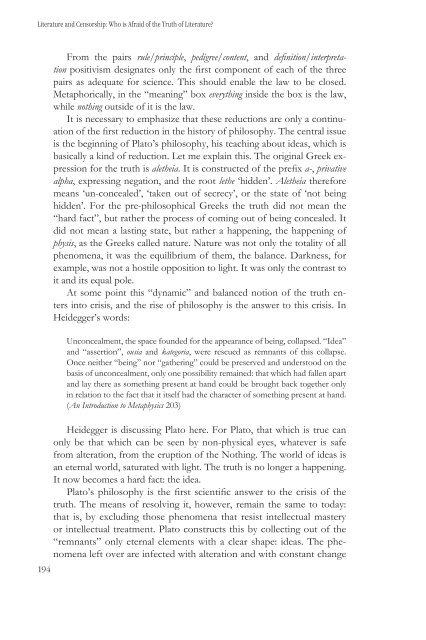Literatura in cenzura - Društvo za primerjalno književnost - ZRC SAZU
Literatura in cenzura - Društvo za primerjalno književnost - ZRC SAZU
Literatura in cenzura - Društvo za primerjalno književnost - ZRC SAZU
- No tags were found...
Create successful ePaper yourself
Turn your PDF publications into a flip-book with our unique Google optimized e-Paper software.
Literature and Censorship: Who is Afraid of the Truth of Literature?194From the pairs rule/pr<strong>in</strong>ciple, pedigree/content, and def<strong>in</strong>ition/<strong>in</strong>terpretationpositivism designates only the first component of each of the threepairs as adequate for science. This should enable the law to be closed.Metaphorically, <strong>in</strong> the “mean<strong>in</strong>g” box everyth<strong>in</strong>g <strong>in</strong>side the box is the law,while noth<strong>in</strong>g outside of it is the law.It is necessary to emphasize that these reductions are only a cont<strong>in</strong>uationof the first reduction <strong>in</strong> the history of philosophy. The central issueis the beg<strong>in</strong>n<strong>in</strong>g of Plato’s philosophy, his teach<strong>in</strong>g about ideas, which isbasically a k<strong>in</strong>d of reduction. Let me expla<strong>in</strong> this. The orig<strong>in</strong>al Greek expressionfor the truth is aletheia. It is constructed of the prefix a-, privativealpha, express<strong>in</strong>g negation, and the root lethe ‘hidden’. Aletheia thereforemeans ‘un-concealed’, ‘taken out of secrecy’, or the state of ‘not be<strong>in</strong>ghidden’. For the pre-philosophical Greeks the truth did not mean the“hard fact”, but rather the process of com<strong>in</strong>g out of be<strong>in</strong>g concealed. Itdid not mean a last<strong>in</strong>g state, but rather a happen<strong>in</strong>g, the happen<strong>in</strong>g ofphysis, as the Greeks called nature. Nature was not only the totality of allphenomena, it was the equilibrium of them, the balance. Darkness, forexample, was not a hostile opposition to light. It was only the contrast toit and its equal pole.At some po<strong>in</strong>t this “dynamic” and balanced notion of the truth enters<strong>in</strong>to crisis, and the rise of philosophy is the answer to this crisis. InHeidegger’s words:Unconcealment, the space founded for the appearance of be<strong>in</strong>g, collapsed. “Idea”and “assertion”, ousia and kategoria, were rescued as remnants of this collapse.Once neither “be<strong>in</strong>g” nor “gather<strong>in</strong>g” could be preserved and understood on thebasis of unconcealment, only one possibility rema<strong>in</strong>ed: that which had fallen apartand lay there as someth<strong>in</strong>g present at hand could be brought back together only<strong>in</strong> relation to the fact that it itself had the character of someth<strong>in</strong>g present at hand.(An Introduction to Metaphysics 203)Heidegger is discuss<strong>in</strong>g Plato here. For Plato, that which is true canonly be that which can be seen by non-physical eyes, whatever is safefrom alteration, from the eruption of the Noth<strong>in</strong>g. The world of ideas isan eternal world, saturated with light. The truth is no longer a happen<strong>in</strong>g.It now becomes a hard fact: the idea.Plato’s philosophy is the first scientific answer to the crisis of thetruth. The means of resolv<strong>in</strong>g it, however, rema<strong>in</strong> the same to today:that is, by exclud<strong>in</strong>g those phenomena that resist <strong>in</strong>tellectual masteryor <strong>in</strong>tellectual treatment. Plato constructs this by collect<strong>in</strong>g out of the“remnants” only eternal elements with a clear shape: ideas. The phenomenaleft over are <strong>in</strong>fected with alteration and with constant change
















